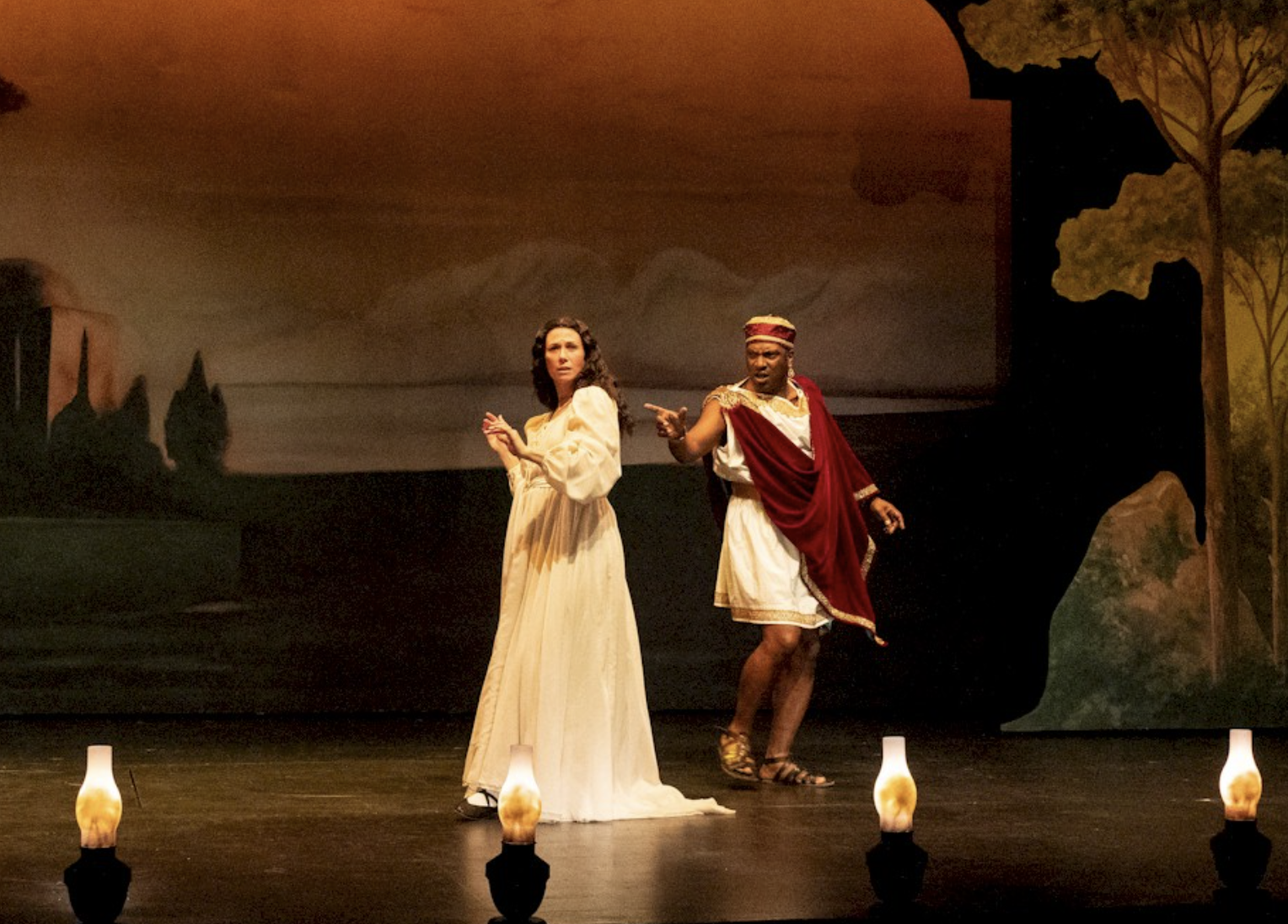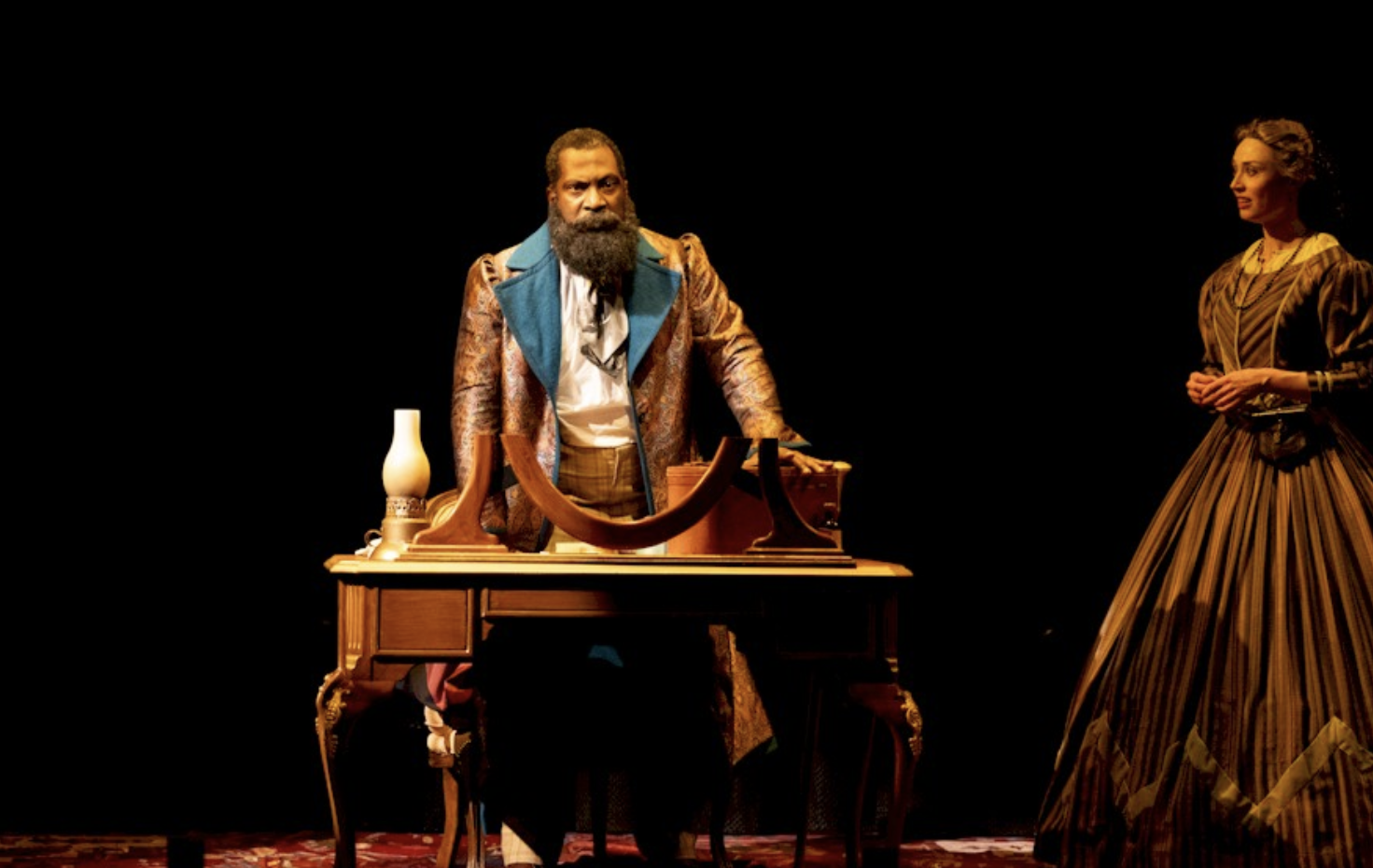Theatre review: Red Velvet tells true story of trailblazing Othello actor, mixing humour and tragedy
Sharp characterizations and atmospheric design touches help create a moving tribute to Ira Aldridge
Lindsey Angell and Quincy Armorer in Red Velvet. Photo by Moonrider Productions
The Arts Club Theatre presents Red Velvet at the Stanley Industrial Alliance Stage to April 21
YOU MAY BE SURPRISED to learn, as I was before watching this play, that the first Black actor to portray the title role in Shakespeare’s Othello on a major international stage didn't emerge until the 19th century, and was in fact American-born.
It’s around this real-life trailblazing figure, Ira Aldridge, that Red Velvet is centred. Not so much a biography, writer Lolita Chakrabarti’s dramatization offers a loose retelling of the thespian’s debut at London’s Theatre Royal. Helped by spirited performances by its cast and an emotional turn by lead Quincy Armorer, director Omari Newton brings an absorbing depth to the story.
We first meet Ira in his old age, hounded by a tenacious young reporter (the lively Tess Degenstein) eager to pen a career-boosting article on the elusive actor. As she lists his extensive, globe-trotting repertoire, she asks about his London premiere in 1833. The memory, marked by the painfully scathing and racist rejection it elicited, stirs Aldridge and transports us alongside him back to that precise moment in time.
Inside Covent Garden’s rehearsal hall, a cast awaits news of Othello’s replacement as abolitionist protests bustle outside. Within the troupe are forward-thinking individuals who welcome social change and the theatre’s ability to mirror it. The more influential voices in the room, however, staunchly cling to tradition. Into this charged atmosphere enters the young, confident Ira. Unfolding like a backstage drama, the show combines historical framing, theatrical references, and sharp characterizations that play up the anachronistic humour.
The American actor introduces a style of acting that is refreshingly natural and a hilarious counterpoint to the “teapot” style embraced by his co-stars, who adhere to exaggerated, rigid postures, and stiff vocal delivery. Sticking to his instincts and boldly giving notes to his castmates, Ira faces immediate opposition from the theatre-owner's son Charles Kean (a paradigm of English snobbery played with embittered chill by Sebastien Archibald).
Ira’s unaffected confidence and undeniable talent, though, manage to find a particularly reticent listener in Ellen (Lindsey Angell), Charles’s fiancée, and the production’s Desdemona. The sudden cracks in her sly and cagey demeanour as she becomes increasingly enamoured with Ira are some of the play's funniest moments. “One must be prepared to play spontaneity,” she tells her male counterpart when requesting they rehearse physically intimate moments.
Equally captivated by Ira’s talent, theatre manager Pierre (the suave John Emmet Tracy) serves as his staunchest advocate. This makes it all the more heartbreaking when, faced with the pressure of critical backlash, Pierre ultimately abandons Ira. The play reaches its thought-provoking climax as Ira comes head to head not with the overtly racist critiques of reviewers, but with the passive betrayal of his supposed friend and ally.
Quincy Armorer and Tess Degenstein in Red Velvet. Photo by Moonrider Productions
Ira passionately believes in the possibility of change. He can’t fathom others' lack of action and refuses to compromise his craft or be confined by expectations. This adds to the tragedy when oppressive forces come crashing down upon him, a reality understood all too well by the largely silent but strong presence of Jamaican servant Connie (Kyla Ward).
Armorer transitions assuredly between the youthful and aged versions of Ira. He adjusts his posture and alters his accent to embody both the younger actor, untainted by the events that followed his debut as Othello, and the older man, haunted but still deeply devoted to his artistry despite being let down by the world. His long white beard (though slightly distracting) and regal robes add to the character’s increasingly elusive aura.
Newton smartly uses technical devices to illuminate the aging actor’s state of mind. Paired with Amir Ofek’s sparse, expressionistic set design, framed by lovely, period-specific oil-lamp stage lights, the approach creates a darker, more hypnotic atmosphere during key moments, when moody illumination or impressive practical effects help sink us deeper into Ira’s psyche. There's also a particularly stunning transition into the play-within-the-play that envelops the stage in a beautiful painted scape of Cyprus.
Similarly, the play's shifts from humour to drama, and from historical to contemporary reflections don’t ever feel jarring. Red Velvet stays captivating throughout its two-hour runtime, ensuring that Aldridge’s legacy and struggles are not forgotten. ![]()















